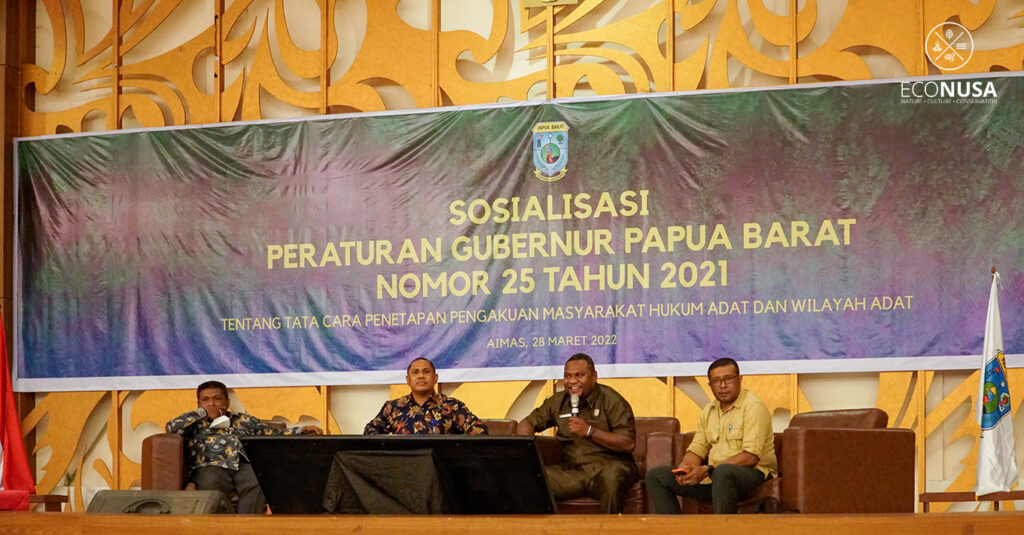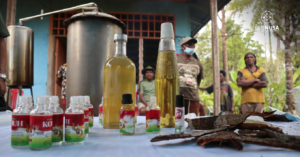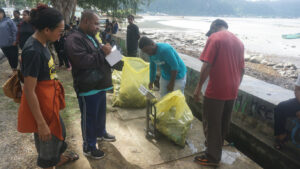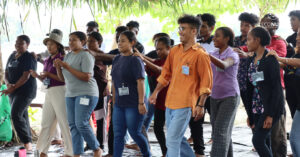
Recognition process of customary land and indigenous people at a certain area usually takes years. The procedure begins with a regulation on procedures of indigenous people recognition and protection issued by the regency or mayoralty governments. Then the regent/mayor establishes a committee on indigenous people to identify indigenous people in their areas, verify, validate, and recommend the regent/mayor to assign the indigenous people.
In West Papua Province, the long process has been shortened by the issuance of West Papua Governor Regulation No. 25/2021 on the Designation Procedure of Indigenous People and Customary Land in November 2021. With the regulation, regency/mayoralty in West Papua need not to draft any regulation on the procedures of indigenous people recognition and protection. The regent/mayor can directly establish the indigenous people committee. The Governor Regulation here is socialized by the West Papua Secretariate’s Legal Bureau in Aimas Convention Center, Sorong Regency, on Monday, 28 March 2022.
Read More: Human Resource Quality, Key to Win West Papua Tourism
Both public and local governments attending the event here gave positive welcome to the new regulation. Some regional representatives claimed that their regions had customary land mapping plan as one of the fundaments of area recognition. Some have run well, but some others remain idle. “In South Sorong, a Rp1.5 billion budget was once allotted for mapping and given to the customary boards, but it did not work. The fund ran out with no result,” said Samsudin Anggiluli, the South Sorong Regent, responding to the issuance of Governor Regulation in the event here.
Samsudin expected that the local government will have stronger basis with the Governor Regulation here to run the region mapping. “We can have budget allocation next year. Hopefully, with the existing Governor Regulation, we will form a team, call all tribal chiefs or customary institution for a discussion, so that we can accomplish it in the next few years,” he said.
Anton Domboret, a youngster representing Arfak and Doreri Tribes living in Manokwari City, said that in addition to mainland recognition, the government should be clear on coastal regions. This is due to the fact that some tribes in West Papua rely much on sea as their sources of livelihood as it is the case with coastal communities in Manokwari up through to Wondama Bay. “We hope the regulation accommodate the coastal community,” Samsudin said.
Read More: Waimon Community Dreams to Manage Shrimp in Bambu Island
On the other hand, Fakfak Secretary, Ali Baham Temongmere, expected that with the customary land recognition, investment to their regions could come in while respecting the indigenous rights and protecting environment. “This enables the indigenous people to manage and get decent benefit. This is the most crucial issue for the next 20 years,” Ali said. He also called the government to give bold borders of the state owned and the locally owned land in Tanah Papua.
Meanwhile, Filemon Ulimpa, youth from Kwakeik Village, Klayili District, in Sorong Regency, called the local government to focus more on the process of customary land recognition. Thus, the special autonomy fund has so far been spent for a development. Meanwhile, there is lacking focus on the designation of customary land. Consequently, conflict frequently happened among the indigenous people and investors entering their region. In addition, some clans of the neighboring territories also happen sometimes. “We hope with the existing Governor Regulation, the government will be more focused. We focus on the indigenous peoples, development and other issues come later,” he said to EcoNusa on the sideline of the event.
Read More: Proper Spatial Planning to Save Women Forest
The socialization event here was opened by West Papua Provincial Secretariate’s Assistant for General Administration, Reymond Richard Hendrik, and attended by West Papua Peoples Assembly, House of Representatives’ West Papua Special Autonomy Fraction, West Papua Provincial Secretariat, Regents, and Mayors of West Papua, Secretariates and Legal Divisions of West Papua, and indigenous people representatives of West Papua. The Decree of Joint Secretariate Team Work on the Acceleration of Recognition and Designation of Indigenous People and Customary Land in West Papua Province was stated in the event.
The Governor Regulation is deemed the West Papua Province’s commitment manifestation focusing on a sustainable development based on customary land. The customary rights owned collectively by the indigenous people in West Papua are deemed part of the indigenous people identities that should be managed in sustainable manner for the welfare of native Papuans, both for today and next generations.
Editor: Leo Wahyudi







